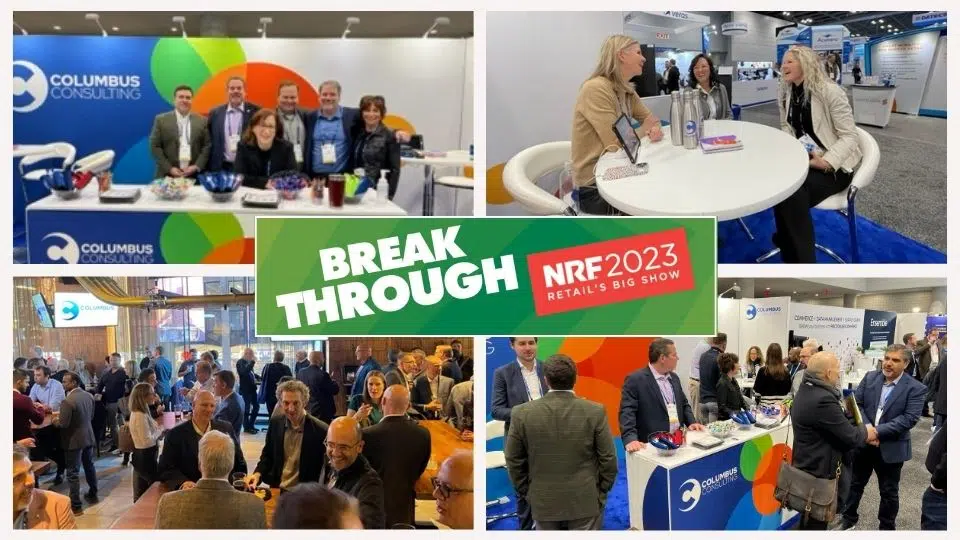By Lucille DeHart

Inflation. Customer Service. Inventory Transparency. Retail Talent. Resale. Marketplace. Robotic Automation. POS. Last Mile. Digital Transformation.
The Big Show 2023 (January 15-17) proved to be a successful post pandemic return for the industry. Conversations from panelists and attendees encompassed everything from economic concerns to environmental progress. Inflation and increased customer debt/reduction in personal savings underlined the cautious outlook for 2023. The industry, once dominated by a focus on safety, contactless shopping and easy transactions has shifted to value, convenience (speed/inventory), quality and price.
Columbus Consulting had experts from every major retail sector on hand to meet with vendors, experience cutting edge demonstrations, participate in thought leadership sessions and host a booth and events to meet directly with the retail community. After 3 full days of immersive participation, our retail practitioners still see a major focus centered upon people, process and technology. People related to the shallow talent pool; process on the transformation from physical to digital touchpoints; and technology on pivots from legacy to cloud-based, integrated systems.
Columbus, a leading retail partner to major global brands for over 20 years, is well-known for strategy and implementation services. The team remains at the forefront of retail and has a real time pulse on the current challenges being faced. The Big Show covered most of the major topics circulating in the industry and catered to all ends of the retail spectrum. Some topics, however, were more prevalent, including:
- The reinvention of the store, it’s role in the unified commerce model and on being the core of brand definition and differentiation.
- Next stage supply chain with end-to-end transparency and establishing scenario planning and more predictability.
- The role and case for marketplace retail as a platform for customer acquisition, trend fulfillment and supplementing merchandise.
- The new resale retail model to drive traffic, transactions and increased basket size.
- Robotic automation from manufacturing to delivery.
- Grocery evolution including digital interfaces, FOH (food at home growth), inflation-driven private label merchandising, and prepared healthy food options.
- Next stage technology: including website de-platforming and transitioning to headless, flexible architecture; OMS and POS modernization; and security and privacy.
As usual, the show attracted top talent across the industry including Macy’s CEO Jeff Gennett, who shared his caution for 2023 with signs of increasing consumer debt and rising delinquency of credit card payments. Macy’s remains a retail model for reinvention with the focus now on shifting to data insights, allocation sciences and pricing strategies and fulfilling the transformative initiatives around supply chain diversification, transport speed and smaller, off-mall real estate expansion.
Similarly, Saks Off 5th President & CEO, Paige Thomas, shared her post pandemic business strategies touting success from her team’s Flash Brand approach to showcasing key products and names. She saw increased competition from regularly priced retailers over the last 2 years as they became highly promotional to drive inventory selling but remains bullish on the rebound of off-price and the use of exceptional customer service as the way forward. Like other retailers, she is seeing customer engagement from the pre-owned sector and believes this trend will continue to build traffic and engagement.
Martin Urrutia Isias, Global Head of Retail Experience at Lego Group was hosted as a featured session with retail admirers of the brand filling the Twilio Stage. The company is fully committed to stores as a key consumer channel, but has pivoted from a transactional only focus to positioning stores as a media and brand channel from which the full retailtainment universe stems. Lego boasts having over 800 stores in 44 countries and embraces a position of “everyone is awesome” using its Lego people as a means to communicate diversity with the addition of culturally diverse Lego people, occupational flexible items like male nurses and even physically challenged Lego people to show inclusion and empowerment across their customer base.
No modern-day conference would be complete without some focus on the Metaverse. The great unknown of retail. Platforms like Roblox, however, are making this new dimension more real for retailers as they have nearly 60 million daily users and are attracting the coveted 17-24 yr. old consumer segment (both male and female). Brands like Tommy Hilfiger and Nars are stepping into this world with Tommy Play and Color Quest to create shared experiences, personalized brand inclusion, global accessibility and localized relevance. Why? Because 70% of those surveyed said that digital identity is more important than physical expression and that they take influences from avatars to apply to themselves in the real world. As this base expands into core market segments the industry will see more revenue coming from virtual merchandise and related offerings.
Other trending conversations included the sustainability topic. Brands like Lego are looking to recycle their plastics and state the longevity of the product as being green, while others are looking at general carbon emissions reductions and shifts to electric vehicle delivery as a means to support the environment. Changes from plastic to paper or no bags, local sourcing and waste elimination have been the main conversation in this space, but the more interesting perspective is surfacing around resale. Brands like IKEA, Levis, Urban Outfitters, REI, Dicks, Lululemon and now even J.Crew are entering this space with expectations of driving more store foot traffic, higher conversions and increased basket size. Ikea’s resale shop-in-shop/buy back program is a full experience for consumers to learn more about the environment, the value of reused goods and what the brand stands for. The kicker, however, is that retailers are now seeing successful KPIs from these pre-owned/vintage merchandise offerings. Ikea quoted a recent 4+% reduction in carbon footprint while driving a 6.5% increase in sales. By 2023 they anticipate becoming a climate positive company. What must be noted here, however, before retailers leap into the resale space, they need to address the operational part of the business. Processes around receiving, inventorying, refurbishing, allocating and merchandising along with pricing and marketing all need to be addressed upfront.
Even with the sexier innovations at hand, the industry continued to highlight their focus and progress on the retail basics continuing to address supply chain, real time inventory location, POS and “shortening the line” evolutions, transitions to cloud based solutions and new order management systems.
Also of note was the featured panel discussion from Macy’s Matt Baer, Chief Digital Officer and Dormify’s Amanda Zuckerman, Founder, who shared their experiences and success from marketplace platforms as both hosts and sellers. Both brands showed the value of the marketplace beyond just sales, speaking to the benefits of identifying trends early, enhancing and supplementing product assortments and building brand awareness with new consumers/customers.
Finally, the show provided a lot of exposure to the grocery side of retail. While grocery was often deemed an adjunct member to the retail business, it is now blending into the industry more seamlessly as consumers are interacting with this sector very similarly. The pandemic, along with digitally native meal prep and solution brands drove a direct-to-consumer emergence that was explosive during the last 3 years. YOY food at home (FOH) increased 8.7% with a 12% increase in grocery apps. Major brands such as Target (20% of their business is grocery), Hershey, Sprout, and Kroger headlined some sessions and were in sync with their identification of the major trends in this space:
- The need for sharper competitive positioning to identify your USPs and brand experience.
- Value without compromise business model.
- Digital enablement.
- Commitment to sustainable practices and healthier food options.
- Scrutiny of partnership and synergistic relationships to assortments and store experiences.
In sum, at home consumption, health and sustainability are driving the future of grocery.
To say the show was comprehensive is an understatement. In addition to the trade floor and educational sessions, NRF hosted their annual innovation lab and a new product showcase. Everything from technology demonstrations to networking events were available. In addition, Columbus Consulting hosted ancillary events including the first CIO Thought Leadership breakfast where 14 leading technology and information systems executives shared key challenges and current practices focused on the headless trend and need for subscription service support, among many other conversations. Topping it all off was the Columbus Retail Annual Party, hosted at the Yard House Times Square. The event attracted over 300 industry partners and reaffirmed what the industry is all about—passion, hard work, comradery and fun.
For a full recap and video footage from the Big Show, visit:
About Columbus Consulting
Columbus Consulting delivers solutions that drive true value and have been transforming the retail and CPG industries for over two decades. We are a boutique retail consulting company of industry experts. Our approach is simple, if you do it, we do it. We are more than consultants; we are experienced practitioners who actually sat in our clients’ seats. We understand the challenges, know what questions to ask and deliver the right solutions. Columbus offers a unique, consumer-centric approach with an end-to-end perspective that bridges functional & organization silos from strategy to execution. Our specialties include: unified commerce, planning & merchandising, sourcing & supply chain, inventory management, finance & operations, data & analytics, information technology and people & organization. Let us know how we can help you.
To learn more, visit COLUMBUSCONSULTING.COM

